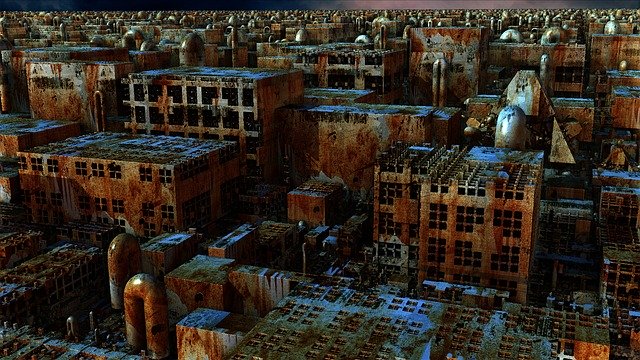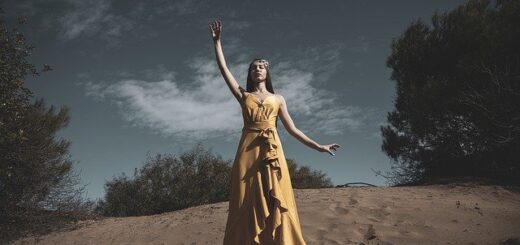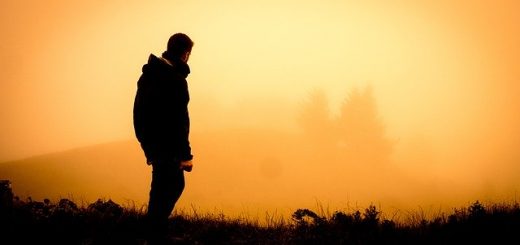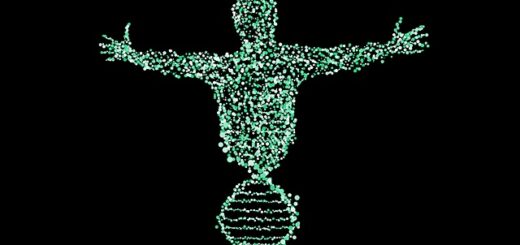The Circus by Andrew Older

The Circus by Andrew Older
Storm clouds were beginning to materialize as Harry and the others pulled into the driveway. Johnson looked up and squinted – to him, the confluence of clouds seemed artificial, as if each cloud was betraying its nature by coming together in such a way. Scarlet remnants of what had been a setting sun could still be seen faintly in the background of the grey-and-black mixture, and the whole image, the way it was shaping out, sent shivers down Johnson’s spine for reasons he couldn’t quite articulate. To him, the sky had bled, and the caked and dusty etches of a tired canvas were melting away. He rubbed his eyes, cleared his throat, and spit on the pavement. The clouds didn’t give a damn about what was about to happen, what he, they, were all about to do. He supposed he needn’t give a damn about the clouds either.
Harry, George, Tommy, and Sarah emptied out of the truck, patted Johnson on the back and headed into the garage. Johnson took one more look up at the sky and scowled. The sky seemed so somber, heavy with something that wasn’t water or anything natural. No – some real cosmic shit was happening, Johnson thought, as he pulled down the garage door behind him and took his place in the circle of chairs.
Paula, Matty, and Ernie were already there, and everyone greeted each other nervously. Indeed, the nervous energy was palpable – the planning that had gone into this had defined each of their lives for the better part of a year. And now that the day arrived, none of it felt real. Johnson squirmed in his chair and took a deep breath.
Harry, the leader of their group, began discussing the particulars of the plan. They all knew the particulars, of course. Hell, Johnson dreamt in the particulars of the plan. But Harry stressed how important it was for everyone to remember that each of them was a cog in the machinery of the overarching event – if one part failed, the machine would fail. Johnson figured the analogy was meant to invigorate each of them with a shared sense of responsibility, but it only served to make him sick and scared. The youngest member of the group, Johnson had never been on a true mission before. But his promise and skills were evident, and his position with regard to the mission was crucial.
Raindrops, gradually at first and then with vigor, began to splatter against the top of the garage. Johnson could hear the clouds groaning. He imagined the sheer onus of the weight the clouds were holding, the unimaginable stress they must suffer under, and felt his brow start to sweat. He swallowed deeply and tried to listen as Harry ran through the last of the issues.
One by one, everyone in the room stood up and headed out toward the back. Eight motorcycles lay under a long, black tarp, and Ernie and Matty untied the cords and flung the tarp aside. Johnson put on his helmet and saddled up onto his motorcycle. He was on the far-right; looking to his left, the view was certainly ominous – seven other riders clad in all black, faceless robots, all of them united by a shared purpose.
Johnson kicked the engine into gear – the soft gurglings that came out of his motorcycle vibrated his entire body. His position was at the rear, and as the other motorcycles began peeling away, one by one, Johnson took a moment to close his eyes and breathe. Rather abruptly, an image of his late mother and father took hold of his mind. It was odd – Johnson had never before been able to remember what his parents had looked like. He was too young, and the circumstances of those murky, distant events were muddled and hazy. But now, this image, this perfectly clear and poignant image, pierced Johnson, and he saw his parents with pure, unfiltered clarity. They looked sad.
Johnson opened his eyes and dropped into line behind the other motorcycles. This was no time for memory, for nostalgia. He swallowed deeply – the past was seductive and lurking, warm and evanescent. It was a blanket, an umbrella in the storm. But many missions often required getting wet, and Johnson frowned and focused.
For forty somewhat years now, as a result of a military coup, their country had been ruled by a ruthless dictator. In that span of time, the population had been cut in half; jobs were scarce; and the military controlled almost every aspect of life. One particularly devastating effect of the military revolution was a stark decline in the quality of healthcare – of note, the infant mortality rate was approximately 300.0 per 1,000 births. Other countries had turned a blind eye to the war and destruction that had taken hold of their home – and so a large group of insurgents, most of them young, had formed an undercover splinter cell in order to fight for and hopefully win back democracy. The dictator had referred to them as a “circus” in one of his weekly briefings on the state-news channel about thirty years back, highlighting how the whole thing was more performance than legitimate political cause. The name was subsequently and warmly embraced by the insurgent group members. Now, thirty somewhat years later, the Circus was a vast nexus of violent and political revolution. Membership meant the real possibility of death. And its members knew, and were even motivated by, this possibility.
The core issue for the Circus, however, was recruitment. Indoctrination started as early as possible in the country, and history textbooks were rewritten and repurposed. More and more people grew to love, even worship, the dictator and government, and the state’s educational methods continued to grow more intense. The Circus’s solution, a solution which perhaps gave them their most notorious reputation, was to kidnap infants from prominent members of the military and raise them in the ways of democracy and freedom. Recently, because the mortality rates were so high, children who were deemed viable were kept in secure, bunker-like hospital buildings, separate from the main hospital wings. Johnson and his friends had been training and working for over a year to infiltrate one of these bunkers and ‘recruit’ the infants to their cause.
Johnson, although much, much too young to remember, was told that his parents, prominent members of the Circus, had been killed by military members as they tried to ‘recruit’ members of their own. The Circus, in a very real sense, raised Johnson. Many of the older members of the Circus had told him how important his parents had been to the cause, and how they would be so proud of what Johnson was about to do. As if there wasn’t enough pressure.
Johnson shivered in his black jacket – it wasn’t terribly cold, but he could still see his breath, misty tentacles that dissipated into the rain. He cracked his neck and focused on Sarah’s motorcycle, the one directly in front of his. Colors began blurring – his eyes had the kind of singular focus in which everything just outside their scope seemed fuzzy and off.
They were heading to Compound DX-4892345, a building right on the edge of one of the biggest cities in their country. Their intel, a nurse/Circus member working in the Compound who would be crucial to the success of the plan, had provided them with the following information: the unit was heavily guarded; there were thirteen babies; they all belonged to prominent members of the military government. This mission would be the first time the Circus had targeted one of the infant Compounds. Additionally, there were similar groups to Johnson’s stationed throughout the country, ready to proceed depending on the success of their mission. Much depended on this night.
Quite suddenly the rain stopped, and the clouds moved apart. Johnson looked up and saw a crescent moon awash in a sea of stars. Now the sky seemed metallic, more machine-like, and it hummed, quivering outward and in waves like a strange pulsar, emanating in all directions from an unknown and invisible source. Johnson felt even more anxious now – at least the rain and mist provided a cover. But there was a sense of symmetry to the sky now, despite the random splattering of stars – it seemed the randomness was choreographed, designed, so to speak. Johnson felt at once moved and unsettled – moved by the sheer beauty of the night sky, and unsettled because it all seemed to be painted by something bigger than himself.
They cleared a hill and suddenly they could faintly make out the city lights. The city itself used to be a sprawling metropolis, a commercial, artistic, and economic center of great importance. Now only the heart of the city, an area on the water, was anything of value – the rest was neglected, broken down, and dangerous.
Johnson had been to the city many times before – in fact, he lived just outside the city limits, and worked as a street cleaner in the downtown area during daytime hours. But now, coming into the city like this, it felt foreign, kind of like meeting a long-lost acquaintance he might have met years before and now was coming across again later in life.
A gust of wind from the ocean came roaring toward them, and Johnson leaned forward into the motorcycle. They were turning up ahead, and he could see Harry lean into the turn with grace. Johnson worshipped Harry – there was no way he was scared, or even nervous – no, Harry was committed, even animated, by the mission. All of them looked up to Harry; after all, he was much older and wiser than the rest of them. But part of Harry’s animation made Johnson feel inadequate, for, although he was certainly motivated, he was scared to die. He imagined Harry would welcome death if it meant furthering the cause.
Eventually they began passing more and more congested spaces, and soon tall and pointed buildings dominated their peripheries. They followed Harry down a few side streets and parked their motorcycles in an old, abandoned warehouse that formerly made luxury boats. Johnson hopped off the motorcycle and joined the others in the corner of the room. George and Sarah climbed onto one of the boats, went below deck, and came back with a chest full of guns, grenades, smoke bombs, a few larger bombs, and walkie-talkies. They passed out the weapons to each person – Johnson received two handguns, three smoke bombs and a walkie-talkie. He swallowed deeply and felt a tickle in his throat. Seeing the actual pieces of a plan that for so long had been theoretical coming together was terrifying.
“Alright, everyone,” Harry began. “Here we are. Moment we’ve all been waiting for. Year in the making – and what a year it’s been. Paula, Sarah, Matty – time to head out. You ring George, Tommy, and Ernie when ready. Then George – you ring me and Johnson. And hey – it’s been real, guys. Really real. I love you all.”
Everyone came together, formed a tight circle, and embraced each other. A few of them shed tears. Johnson felt absolutely nothing – he tried to summon some emotion, if not for the mission, at least for his friends. But it seemed as if his emotions had stopped working. He felt like he might throw up.
Paula, Sarah and Matty nodded to everyone and ran out. The rest of them waited. Johnson’s leg was shaking. Soon it began to rain again, and Johnson breathed a sigh of relief. He didn’t know why – the sound of raindrops exploding into fragments on the metallic roof of the warehouse, rhythmic and constant, calmed him. Sounds of thunder were odd things, Johnson thought – depending on where you were, who you are with, and how you were feeling, thunder could be either comforting or terrifying. He breathed deeply, stood up, and stretched. He looked at all the others – they seemed so ready, so determined, so alive. The thought that they might be feeling similarly to Johnson and were just more successful at putting on airs gave him some comfort.
After about an hour, they got the call. Paula, Sarah and Matty had set up the bombs around the perimeter of the compound, and were stationed in one of the vacant, adjacent lots, ready to move into Phase 2. George, Tommy and Ernie nodded to Harry and Johnson and ran out. Another hour passed. Harry walked over to Johnson and put his arm on his shoulder.
“How ya feeling, buddy?”
Johnson smiled, nervously. “Oh, you know. A little nervous. But obviously ready. Ready as ever.”
Harry nodded. “Johnson, you’re like a son to me. Whatever happens tonight, I want you to know that you’ve had an impact on my life. Our situation, for better or for worse, has given me your friendship. And I’m really grateful for that.”
“Harry – I – I don’t know what to -”
Harry smiled. “No need to say anything. Just wanted to tell you that.”
Almost as if on cue, they got their call. They both sprung up, collected their things and ran out the door. Instinct took over Johnson – the fears and reservations were still there, lodged in the back of his mind like an imprisoned observer – but his body started moving of its own volition. The rain pierced the sky, slicing it into pockets of cold and biting air. Johnson ran through his own breath, into the steady stream of rain, into the shadowy darkness that lay ahead. He followed Harry, trying to mirror his footsteps, his gait, the way he carried himself. Johnson didn’t even feel like he was running – no, it felt more like he was being strung along some invisible string, some foundation embedded into the fabric of the air. Soon enough he realized he could no longer feel anything – the rain, the cold, the feeling of concrete – he felt none of it.
Soon they could see the smoke. The Compound itself was a tall, fearsome looking building, and it was up in flames. Johnson tripped over something and realized it was an arm – he swallowed again and tried to look forward. Smoldering remnants of the roof lay scattered across the city streets, and the sound of sirens echoed loudly. There were four guard towers in each corner of the Compound, and, hopefully, George, Sarah, Paula and Matty were each occupying one. Suddenly Johnson heard a gunshot and stopped – a body, that of a guard, crumbled to the floor directly next to him. He looked up toward one of the guard towers, and Sarah, looking down, gave him a nod.
Harry and Johnson sprinted toward the Compound. The rain and wind were mixing with the flames and the smoke and the whole building seemed overwhelmed by a burning, rust-colored sphere of fire. Rain drops sliced through and exploded parts of the surface of the ball of flames, and, for a moment, Johnson was dumbstruck by the beauty of destruction. He knew this was why some people joined the Circus – to bring about and witness destruction, to see the inundating beauty of things falling apart. He’d even heard a group of older members discussing the philosophy of chaos, about the abstract seduction of ceaseless change. Johnson frowned – that was not what he was fighting for. In fact, he, they, were fighting for something permanent.
Just as Johnson was about to follow Harry into the building, he was knocked senseless by a large behemoth of a man. He lost consciousness for a moment, and the last thing he saw before fading into oblivion was Harry ducking under gunfire and lunging a knife into the large man’s abdomen.
Johnson saw his parents’ faces. They looked young, scared, and hopeless. Johnson tried to reach out, to touch their faces, to hold their cheeks in his hand. But, as suddenly as the image had appeared in his mind, the faces exploded into a fine mist that settled over his unconsciousness. A twinkle; static sounds; blinking lights. He woke to Harry’s calm and nurturing voice.
“Up and at ‘em, Johnson.”
Johnson nodded. He tasted blood, but, surprisingly, felt no pain. Perhaps the adrenaline was coursing through his body at too high a volume.
Together they ascended the stairs. Pieces of wall and ceiling were falling all about them, so they had to be fast. This part of the plan was the most time-sensitive, and by far the most important. The thirteen babies were being held on the second floor, in a windowless room that was about 20 by 30 feet. The nurse’s schematics had shown them that the eastern wall of the room bordered the Compound’s parking garage, and the success of the plan hinged on Tommy and Ernie having the van parked on the wall’s other side. Once the rest of the crew heard the specific siren that accompanied a break within the babies’ room, they would all flee – the rendezvous point was far, far from the city, and the thought of having drinks with his comrades, his friends, as they celebrated the mission’s success provided Johnson with a feeling of warmth.
They climbed the set of stairs and arrived at the door. Harry gave the knock, and the nurse let them in. Immediately the siren went off – this particular alarm would trigger a much larger military response. Harry and Johnson ran into the room and shut the door behind them.
Harry embraced the nurse. “You’ve been spectacular,” Harry said, holding her tightly. “You are the reason for the mission’s success. Alright – Johnson, help me set up the charges against the eastern wall.”
But Johnson’s eyes were drawn to something else. In the corner of the room, next to one of the baby’s cradles, was a picture of the presumed parents – an older couple holding hands. Johnson’s mouth fell open. The people in the photo matched exactly the images in his head. He walked over, caught in some all-encompassing rapture, and picked up the picture. He looked down at the baby and back at the picture. He looked up at the metallic shelves and tried to glean his reflection. Yes, the resemblance, it was uncanny. The sirens seemed to wail even louder.
Harry spoke again, this time a little louder. “Johnson, come on, now. We have very little time.”
“These people,” Johnson said, without taking his eyes off the picture. “I know this sounds strange, but they look just like what I imagine my parents looked like.”
Harry frowned. “That’s ridiculous, Johnson. Your parents died twenty years ago.”
Johnson, slowly, turned toward Harry. It felt like the weight of the entire world was crashing in from all sides. Pieces were beginning to put themselves together, and suddenly he was transported back in time, and was able to observe an earlier part of his life. It was more than simply a memory – it was some sort of cosmic feeling that connected him across times.
He could see himself, no more than five or six, sitting in the corner of a well-furnished, well-to-do apartment, except that the whole place was on fire. He saw his parents, their faces the ones in the picture and the ones in his images but much younger, as they shielded Johnson from the oncoming attack of numerous people entering their apartment. He saw his mother go down; he saw his father go down; and he saw someone pick him up and run out as the whole place collapsed into itself. His parents tried to stand but were too weak. And then the memory was gone.
“These are my parents, Harry.” There were tears in Johnson’s eyes. “These are my parents.”
Suddenly everything froze. Johnson stopped and looked up at the ceiling – he could make out each strand of dust as it tossed and turned in the hazy, choked air of the room. The objects in his vision became images which blurred and then spun around him, faster and faster until everything melded into something greater than the sum of its parts. And then, in a series of events that mimicked a series of blackouts, there was Harold running over to him; the doors exploded; the nurse’s chest was riddled with bullets; the wall to the garage exploded; and in the symphony of sirens, in the mixture of heat and crumbling plaster and ash and smoke, and in the heat of the moment, Johnson passed out.
He was floating beneath a dark and murky ocean. Light seemed to protrude from a source deep underwater – streams and pillars of light, hazy and blurred by the movement of the waves, rocketed out of the water’s surface and illuminated they sky – but it wasn’t really a sky – no, it seemed to be a ceiling checkered with translucent stalagmites. The lights from the ocean bounced off of the stalagmites and created a web, a labyrinth, a nexus of light and color and dust. Johnson looked up and felt himself a part of the light; felt himself bouncing all about the stalagmites; felt himself in each particle of dust. The view from below was intoxicating, and he felt connected to something bigger than himself.
Suddenly he surfaced, and he could hear the saddest, most melancholy music he had ever heard in his entire life. He looked up more closely at the ceiling and realized the music was a result of the sounds the lights made as they bounced off the stalagmites. He looked closer, listened more closely, and realized that, somehow, the lights were crying. The whole thing – it was a loud and stratified cry for help, a tortured harmony and a bitter melody. The song of the light was one of deep sadness – but there was something driving it, deeper than just sadness. Perhaps pain mixed with regret and longing, the kind of pain one gets from having joy and then losing it forever.
The water rose, slowly at first, but eventually it gained a steady, solid pace. Johnson realized the water would press him up and into the stalagmites – very soon, drowning became the more appealing of the deaths, and he swam underwater for as long as he could – he swam toward the source of the light, the song. But something was wrong – the source of the light seemed unexplainably dark. He kept swimming, on and on and on until suddenly the darkness consumed him.
He awoke in the back of a van. There was a sunroof, and he could see a vast tapestry of stars blanketing the night sky. It was so beautiful that he began to cry. He tried to move, but his whole body was in too much pain. Soon his crying was joined by another voice, a baby’s crying, subsequently followed by another baby’s crying. He closed his eyes and saw the stars even more clearly than ever. Somewhere in that constellation of starry blackness, even with his eyes closed, he could make out what appeared to be his parents’ faces. Only this time, they were simply outlines, filled in by a shadowy nothingness that permeated the cosmos. Johnson closed his eyes and smiled; he chose to imagine them as happy.
THE END
Copyright Andrew Older 2020



